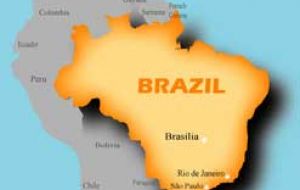MercoPress. South Atlantic News Agency
Brazil confirms inflation target; January IPCA 0.54%

Brazil's monthly inflation slowed in January for the first time in four months as food prices eased. Consumer prices, IPCA index, rose 0.54% in January, down from a 0.74% jump in December, reported Wednesday the Brazilian Geography and Statistics Institute, IBGE.
Sao Paulo analysts believe that the inflation report may damp concern that the Central Bank will need to raise interest rates in the months ahead to meet its annual inflation target of 4.5%. The bank's monetary committee held the benchmark rate at a record low 11.25% over the last three meetings to assess whether the recent jump in inflation is temporary. The Brazilian central bank snapped its longest cycle of rate cuts in October, after taking the overnight rate down 8.50 percentage points from 19.75% to 11.25% in two years. Inflation in the last twelve to January quickened to 4.56%, up from 4.46% in the same period a month earlier. The annual rate has steadily risen from the eight-year low of 2.96% reached in March 2007. Food price inflation, which decelerated to 1.52% in January from 2.06% in December, still accounted for more than half of the monthly rate. However inflation in February may accelerate because of the start of the school year. In New York Brazilian central bank President Henrique Meirelles said the country's "inflation risk premium" will decline further as investors grow more confident that the target for consumer prices this year will be met. "I want to make clear, and it's important that the market knows, that we're committed to the inflation target" Meirelles told investors at a conference at the Brazilian American Chamber of Commerce in New York. Greater stability in Brazil's economy and the bank's commitment to the inflation target have helped lessen the risk of "negative surprises", paving the way for further declines in the premium, he said. Brazil's monetary policy has helped drive real interest rates lower since 2003 as Latin America's largest economy opted for a quick process of curbing inflation, Meirelles said. "Other countries chose to lower inflation over many years, but Brazil chose a quick disinflation program", underlined Meirelles. Real interest rates, or borrowing costs adjusted to inflation, fell to 7.4% on February according to data presented by Meirelles during his address. That compares with an average real interest rate of 8.4% during 2006 and 2007. Meirelles said the central bank still projects economic growth of 4.5% this year, after a 5.2% expansion in 2007 as a slowdown in the U.S. economy had already been factored into the bank's estimates.




Top Comments
Disclaimer & comment rulesCommenting for this story is now closed.
If you have a Facebook account, become a fan and comment on our Facebook Page!